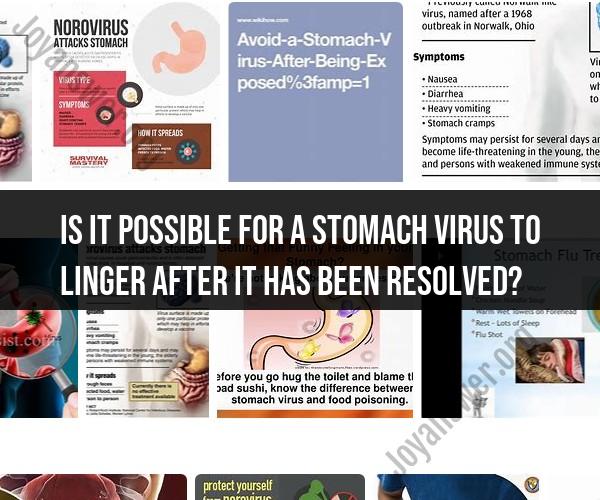Is it possible for a stomach virus to linger after it has been resolved?
Stomach viruses, such as those caused by norovirus or rotavirus, typically cause acute gastrointestinal symptoms like diarrhea, vomiting, abdominal pain, and nausea. These infections are usually self-limiting, meaning they resolve on their own within a few days to a week. Most people recover fully without any lingering effects.
However, there are situations in which residual effects or complications can occur after a stomach virus:
Dehydration: One of the most common concerns during a stomach virus infection is dehydration due to vomiting and diarrhea. Even after the virus is no longer active, it may take some time for the body to fully recover from the fluid loss. Dehydration can cause symptoms like fatigue, weakness, and dizziness.
Gastrointestinal Symptoms: Some individuals may experience lingering gastrointestinal symptoms, such as mild diarrhea or occasional stomach discomfort, for a short period after the virus has cleared. This can be a result of irritation and inflammation of the gastrointestinal tract during the infection.
Weakened Immune System: Stomach viruses can temporarily weaken the immune system, making individuals more susceptible to other infections. In some cases, a secondary infection may occur after the initial virus has resolved.
Persistent Symptoms: In rare cases, individuals may continue to experience symptoms for an extended period after the virus has cleared. This could be due to post-infectious irritable bowel syndrome (IBS), which can cause ongoing gastrointestinal symptoms.
It's important to note that if you or someone you know experiences severe or persistent symptoms after a stomach virus, it's advisable to seek medical attention. A healthcare provider can evaluate the situation, provide appropriate treatment, and rule out any other underlying medical conditions.
To prevent stomach viruses, practice good hygiene, including frequent handwashing, and avoid contact with individuals who are sick with gastrointestinal symptoms. Additionally, stay hydrated if you do contract a stomach virus to help your body recover more quickly.













